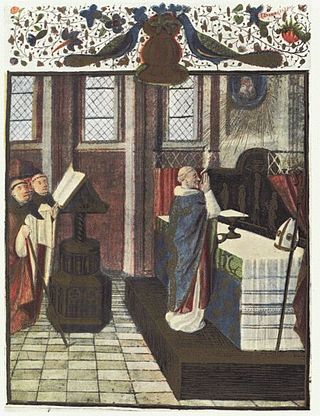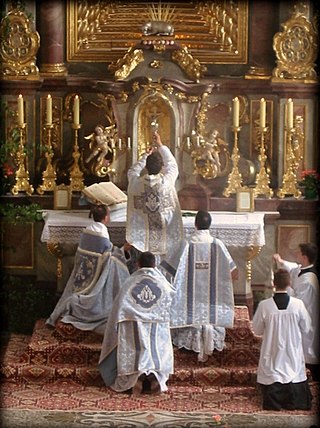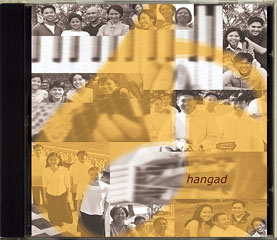
Mass is the main Eucharistic liturgical service in many forms of Western Christianity. The term Mass is commonly used in the Catholic Church, Western Rite Orthodoxy, Old Catholicism, and Independent Catholicism. The term is also used in some Lutheran churches, as well as in some Anglican churches, and on rare occasion by other Protestant churches.

The Tridentine Mass, also known as the Traditional Latin Mass, the Traditional Rite, or the Extraordinary Form, is the liturgy in the Roman Missal of the Catholic Church codified in 1570 and published thereafter with amendments up to 1962. Celebrated almost exclusively in Ecclesiastical Latin, it was the most widely used Eucharistic liturgy in the world from its issuance in 1570 until the introduction of the Mass of Paul VI.

"Gloria in excelsis Deo" is a Christian hymn known also as the Greater Doxology and the Angelic Hymn/Hymn of the Angels. The name is often abbreviated to Gloria in Excelsis or simply Gloria.
Alleluia is a phrase in Christianity used to give praise to God. In Christian worship, Alleluia is used as a liturgical chant in which that word is combined with verses of scripture, usually from the Psalms. This chant is commonly used before the proclamation of the Gospel. In Western Christianity, congregations commonly cease using the word Alleluia during the period of Lent but restore it into their services at Easter. The form of praise "Alleluia" is used by Christians to thank and glorify God; it finds itself present in many prayers and hymns, especially those related to Eastertide, such as "Christ the Lord is Risen Today".

The Introit is part of the opening of the liturgical celebration of the Eucharist for many Christian denominations. In its most complete version, it consists of an antiphon, psalm verse and Gloria Patri, which are spoken or sung at the beginning of the celebration. It is part of the proper of the liturgy: that is, the part that changes over the liturgical year.

A missal is a liturgical book containing instructions and texts necessary for the celebration of Mass throughout the liturgical year. Versions differ across liturgical tradition, period, and purpose, with some missals intended to enable a priest to celebrate Mass publicly and others for private and lay use. The texts of the most common Eucharistic liturgy in the world, the Catholic Church's Mass of Paul VI of the Roman Rite, are contained in the 1970 edition of the Roman Missal.

The Anaphora, Eucharistic Prayer, or Great Thanksgiving is a portion of the Christian liturgy of the Eucharist in which, through a prayer of thanksgiving, the elements of bread and wine are consecrated. The prevalent historical Roman Rite form is called the "Canon of the Mass."

The Roman Rite is the most common ritual family for performing the ecclesiastical services of the Latin Church, the largest of the sui iuris particular churches that comprise the Catholic Church. The Roman Rite governs rites such as the Roman Mass and the Liturgy of the Hours as well as the manner in which sacraments and blessings are performed.

The term "Celtic Rite" is applied to the various liturgical rites used in Celtic Christianity in Britain, Ireland and Brittany and the monasteries founded by St. Columbanus and Saint Catald in France, Germany, Switzerland, and Italy during the Early Middle Ages. The term is not meant to imply homogeneity; instead it is used to describe a diverse range of liturgical practices united by lineage and geography.

The Canon of the Mass, also known as the Canon of the Roman Mass and in the Mass of Paul VI as the Roman Canon or Eucharistic Prayer I, is the oldest anaphora used in the Roman Rite of Mass. The name Canon Missæ was used in the Tridentine Missal from the first typical edition of Pope Pius V in 1570 to that of Pope John XXIII in 1962 to describe the part of the Mass of the Roman Rite that began after the Sanctus with the words Te igitur. All editions preceding that of 1962 place the indication "Canon Missae" at the head of each page from that point until the end of the Mass; that of 1962 does so only until the page preceding the Pater Noster and places the heading "Ordo Missae" on the following pages.
The Roman Canon is the oldest eucharistic prayer used in the Mass of the Roman Rite, and dates its arrangement to at least the 7th century; its core, however, is much older. Through the centuries, the Roman Canon has undergone minor alterations and modifications, but retains the same essential form it took in the seventh century under Pope Gregory I. Before 1970, it was the only eucharistic prayer used in the Roman Missal, but since then three other eucharistic prayers were newly composed for the Mass of Paul VI.
The text and rubrics of the Roman Canon have undergone revisions over the centuries, while the canon itself has retained its essential form as arranged no later than the 7th century. The rubrics, as is customary in similar liturgical books, indicate the manner in which to carry out the celebration.

The Mass is the central liturgical service of the Eucharist in the Catholic Church, in which bread and wine are consecrated and become the body and blood of Christ. As defined by the Church at the Council of Trent, in the Mass "the same Christ who offered himself once in a bloody manner on the altar of the cross, is present and offered in an unbloody manner". The Church describes the Mass as the "source and summit of the Christian life", and teaches that the Mass is a sacrifice, in which the sacramental bread and wine, through consecration by an ordained priest, become the sacrificial body, blood, soul, and divinity of Christ as the sacrifice on Calvary made truly present once again on the altar. The Catholic Church permits only baptised members in the state of grace to receive Christ in the Eucharist.

Hangád is an inspirational vocal ensemble known for songs like Pananatili, Pagkakaibigan, and Panunumpâ. It consists of former members of Days with the Lord.

Hangad is the self-titled debut album of the Philippine-based vocal ensemble Hangad. It contains the singles "Pananatili" and "Panunumpa", the latter of which was popularized by pop singer Carol Banawa.

Hangad a Capella is the second album recorded by Philippine-based vocal ensemble Hangad. As the title says, all songs in this album were recorded without any musical accompaniment. Most songs in a Capella are arrangements of familiar Filipino religious and inspirational songs; with the exception of two tracks, a Capella was indeed to be a collection of songs composed by Jesuit composers.

Pasko Naming Hangad is the third album recorded by Philippine-based vocal ensemble Hangad. It is Hangad's first Christmas-themed album, containing original compositions and arrangements of some familiar Christmas songs.

A Wish for Christmas is the fifth album recorded by Philippine-based vocal ensemble Hangad. It is also the group's second Christmas album, the first being Pasko Naming Hangad. It is Hangad's shortest album to date, with four tracks.

The liturgical books of the Roman Rite are the official books containing the words to be recited and the actions to be performed in the celebration of Catholic liturgy as done in Rome. The Roman Rite of the Latin or Western Church of the Catholic Church is the most widely celebrated of the scores of Catholic liturgical rites. The titles of some of these books contain the adjective "Roman", e.g. the "Roman Missal", to distinguish them from the liturgical books for the other rites of the Church.

Bakit Hindi Ka Crush ng Crush Mo? is a 2013 Filipino film adaptation of Ramon Bautista's self-help book of the same name. The romantic comedy film is produced by Star Cinema and is part of its 20th Anniversary presentation. It tells the story of a brainy ugly duckling girl and her journey as she turns into someone who's worth loving. Ramon Bautista also stars in the film as a taxi driver. It is the first movie team up of Kim Chiu and Xian Lim and is directed by Joyce Bernal.

















